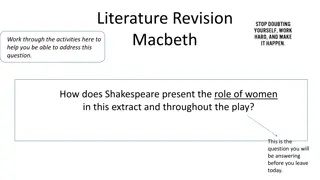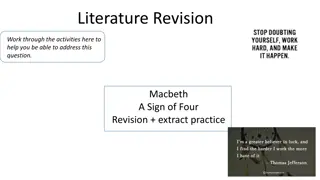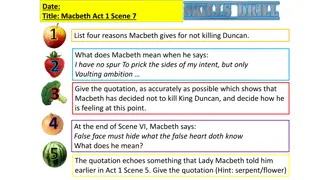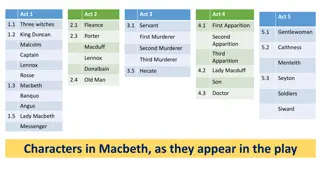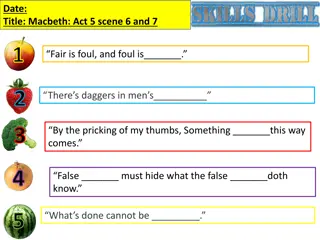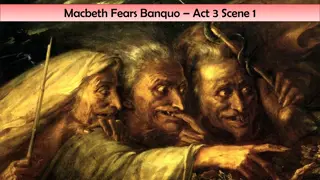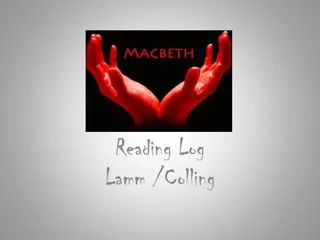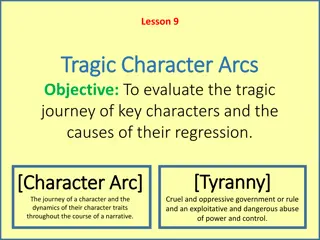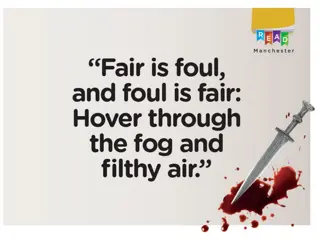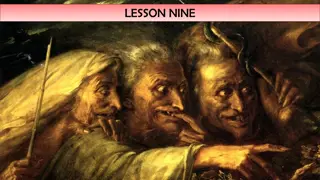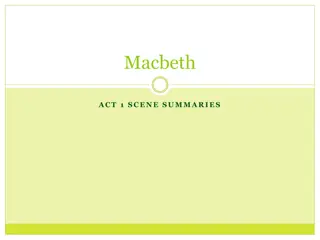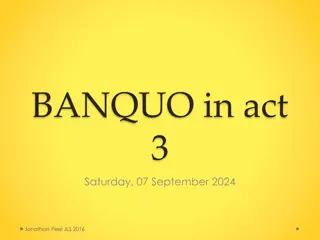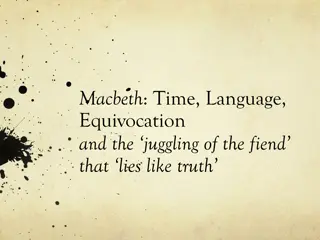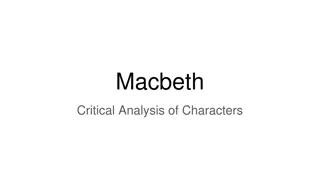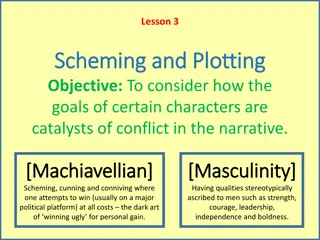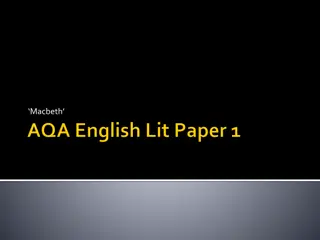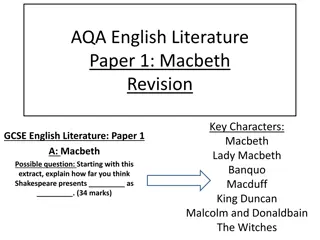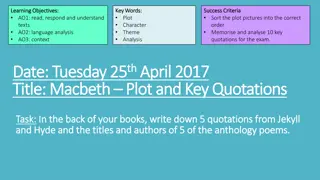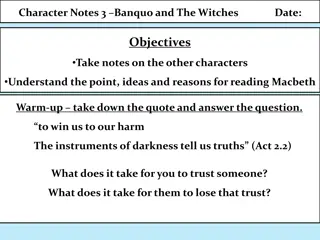Insights into Shakespeare's Life and Work
During Shakespeare's era, the life of a playwright was filled with challenges and uncertainties. From the Lost Years to his rise as a renowned playwright, this period was marked by performances for Queen Elizabeth I, collaborations with the Lord Chamberlain's Men, and the establishment of The Globe Theater. Discover the historical context behind Macbeth and the intricate relationships between Shakespeare and royalty.
Download Presentation

Please find below an Image/Link to download the presentation.
The content on the website is provided AS IS for your information and personal use only. It may not be sold, licensed, or shared on other websites without obtaining consent from the author. Download presentation by click this link. If you encounter any issues during the download, it is possible that the publisher has removed the file from their server.
E N D
Presentation Transcript
by William Shakespeare Dr. Archana Gupta, Asso. Prof. English
Life of a Playwright During Shakespeare s days, the life of a playwright was hardly deemed worthy! The years between his marriage and departure for London are called the Lost Years. Little known about what he did. First gained status when he performed for Queen Elizabeth I (with whom he was very popular) By 1594 six of his plays were written and produced.
Originally, his plays were not written to be read as literature, but as consumable materials. Manuscripts were not circulated due to the fact that the content could be stolen and this was their livelihood. It is a known fact that Shakespeare borrowed widely from many sources. 1594 He performed and wrote for a group of actors called the Lord Chamberlain s Men. Most of his performances were done for royalty.
The Globe Theater 1599 Burned in 1613
When in a play... Only men were permitted to perform Boys or effeminate men were used to play the women Costumes were often the company s most valuable asset Costumes were made by the company, bought in London, or donated by courtiers
Macbeth: The Historical Context Macbeth is supposed to have been written sometime between 1603 and 1606, after The King s Men gained King James s patronage. It is the play which best represents the relationship between Shakespeare and the King. King James claimed to be a descendant of Banquo, with only eight kings in between them. James was also famous for his obsessions with the Divine Right Theory and with witchcraft, two big themes that Shakespeare incorporates into the play. King James I
Historical Context, Continued Shakespeare took the basic story of Duncan and Macbeth from Hollinshed s Chronicles, which dates the reign of these two Scottish monarchs between 1034 - 1057. Because he had to please his patron, Shakespeare made the character of Macbeth much more villainous than he probably was. (Shakespeare used the same flattery to please his Tudor patrons in Richard III)
King Duncan of Scotland- Honest and good Malcolm & Donalbain -Sons of the King, Malcolm is the eldest son Macbeth -Duncan s most courageous general Ambition to become king corrupts him Banquo -General and Macbeth s best friend Lady Macbeth -As ambitious as her husband A dark force behind his evil deeds Macduff -Scottish general, kills Macbeth
Supernatural forces Wiches- three weird sistes Hecate Aparitions The ghost of Banquo
Tragic Hero Def. Man of high standard who falls from that height because of a flaw that has affected many - Aristotle Macbeth is one of the most famous examples of the tragic hero.
So what really happens? Good man goes bad He wants power Married to a wicked lady She also wants power Kills many people Gets power Gets paranoid (a.k.a. goes crazy) He meets his downfall at the end
Tragedy (Shakespearean) Drama where the central character/s suffer disaster/great misfortune In many tragedies, downfall results from> Fate Character flaw/Tragic flaw Combination of the two
Soliloquy Long speech expressing the thoughts of a character alone on stage. Aside Words spoken, usually in an undertone to the audience not intended to be heard by all characters
Dramatic Irony A contradiction between what a character thinks and what the reader/audience knows to be true
Verbal Irony Words used to suggest the opposite of what is meant Situational Irony An event that directly contradicts the expectations of the characters, the reader, or the audience
Comic Relief Use of comedy within Tragedy in order provide relief from seriousness or sadness. In Macbeth the Porter scene provide comic relief .
Theme Good vs. Evil Ambition
The idea virtous should be rewarded and vice should be punished. Poetic justice has been employed in Macbeth.



